|
|
|
Sort Order |
|
|
|
Items / Page
|
|
|
|
|
|
|
| Srl | Item |
| 1 |
ID:
150992
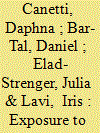

|
|
|
|
|
| Summary/Abstract |
Does ongoing exposure to political violence prompt subject groups to support or oppose compromise in situations of intractable conflict? If so, what is the mechanism underlying these processes? Political scholarship neither offers conclusive arguments nor sufficiently addresses individual-level forms of exposure to violence in the context of political conflict, particularly the factors mediating political outcomes. We address this by looking at the impact of exposure to political violence, psychological distress, perceived threat, and ethos of conflict on support for political compromise. A mediated model is hypothesized whereby exposure to political violence provokes support for the ethos of conflict and hinders support for compromise through perceived psychological distress and perceived national threat. We examined representative samples of two parties to the same conflict: Israelis (N = 781) and Palestinians from Gaza, East Jerusalem, and the West Bank (N = 1,196). The study’s main conclusion is that ethos of conflict serves as a mediating variable in the relationship between exposure to violence and attitudes toward peaceful settlement of the conflict.
|
|
|
|
|
|
|
|
|
|
|
|
|
|
|
|
| 2 |
ID:
177755
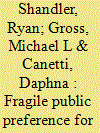

|
|
|
|
|
| Summary/Abstract |
To what extent does the public support the use of cyber weapons? We propose that public exposure to the destructive potential of cyber-attacks will dispel the clear cross-national preference for cyber strikes. To test this, we conducted two survey experiments (n = 2,585) that examine support for cyber versus conventional military strikes in the United States, United Kingdom, and Israel. In study 1, we exposed respondents to television news reports depicting various forms of terror attacks, and then measured the subsequent support for retaliatory options. Findings indicate that the high public support for deploying cyber weapons dissipated entirely among respondents exposed to lethal cyber-attacks. In study 2, we probed this vanishing support, finding that exposure to destructive cyber-attacks undercuts the perception of cyber as a less lethal domain, therefore diminishing its appeal. We conclude by discussing how the fragile public preference for cyber weapons encourages military escalation in the short-term.
|
|
|
|
|
|
|
|
|
|
|
|
|
|
|
|
| 3 |
ID:
168996
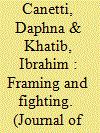

|
|
|
|
|
| Summary/Abstract |
How does the subjective conceptual framing of conflict impact the warring parties’ attitudes towards political compromise and negotiation? To assess strategies for conflict resolution, researchers frequently try to determine the defining dispute of a given conflict. However, involved parties often view the conflict through fundamentally distinct lenses. Currently, researchers do not possess a clear theoretical or methodological way to conceptualize the complexity of such competing frames and their effects on conflict resolution. This article addresses this gap. Using the Israeli–Palestinian conflict as a case study, we run a series of focus groups and three surveys among Jewish citizens of Israel, Palestinian citizens of Israel (PCIs), and Palestinians in the West Bank. Results reveal that three conflict frames are prominent – material, nationalist, and religious. However, the parties to the conflict differ in their dominant interpretation of the conflict. Jewish Israelis mostly frame the conflict as nationalist, whereas Palestinians, in both the West Bank and Israel, frame it as religious. Moreover, these frames impact conflict attitudes: a religious frame was associated with significantly less willingness to compromise in potential diplomatic negotiations among both Jewish and Palestinian citizens of Israel. Interestingly, differing frames had no significant impact on the political attitudes of West Bank Palestinians, suggesting that the daily realities of conflict there may be creating more static, militant attitudes among that population. These results challenge the efficacy of material solutions to the conflict and demonstrate the micro-foundations underpinning civilians’ conflict attitudes and their implications for successful conflict resolution.
|
|
|
|
|
|
|
|
|
|
|
|
|
|
|
|
| 4 |
ID:
183004
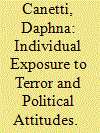

|
|
|
|
|
| Summary/Abstract |
How does exposure to terrorism affect political attitudes? This paper presents a new individual-level psychobiological model of political attitudes. Using a unique individual-level data of personal exposure to terrorism, a physiological marker of inflammation (CRP) and a psychological measure of perception of threat to an ongoing conflict—the Israel-Palestinian Conflict—we assess the effect of personal exposure to terrorism on militant attitudes concerning the conflict. Our data of physiological (blood samples), psychological, and attitudinal factors were collected in Israel during a military escalation along the Gaza Strip border. The findings reveal that among people personally exposed to terrorism, the perception of threat mediates an association between physiological conditions and militant attitudes. These findings contribute to the emerging literature on the biopolitics of political violence, suggesting a renewed focus on the dynamic interplay between physiological, psychological, and political factors.
|
|
|
|
|
|
|
|
|
|
|
|
|
|
|
|
| 5 |
ID:
100393
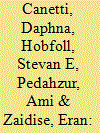

|
|
|
|
|
| Publication |
2010.
|
| Summary/Abstract |
The association between religion and violence has raised much interest in both academic and public circles. Yet on the individual level, existing empirical accounts are both sparse and conflicting. Based on previous research which found that religion plays a role in the support of political violence only through the mediation of objective and perceived deprivations, the authors test Conservation of Resource (COR) theory as an individual level explanation for the association of religion, socio-economic deprivations, and support for political violence. COR theory predicts that when individuals' personal, social or economic resources are threatened, a response mechanism may include violence. Utilizing two distinct datasets, and relying on structural equation models analysis, the latter two stages of a three-stage study are reported here. In a follow-up to their previous article, the authors refine the use of socio-economic variables in examining the effects of deprivation as mediating between religion and political violence. Then, they analyze an independent sample of 545 Muslims and Jews, collected during August and September 2004, to test a psychological-based explanation based on COR theory. This study replaces measures of deprivation used in the previous stages with measures of economic and psychological resource loss. Findings show that the relationship between religion and support of political violence only holds true when mediated by deprivations and psychological resource loss. They also suggest that the typical tendency to focus on economic resource loss is over-simplistic as psychological, not economic, resources seem to mediate between religion and support of violence.
|
|
|
|
|
|
|
|
|
|
|
|
|
|
|
|
| 6 |
ID:
128964
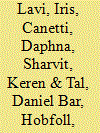

|
|
|
|
|
| Publication |
2014.
|
| Summary/Abstract |
Can endorsement of the ethos of conflict alter psychological effects of exposure to political violence? Israelis and Palestinians have been in a state of political and military turmoil for decades. We interviewed 781 Israelis and 1,196 Palestinians living in the West Bank, Gaza Strip, and East Jerusalem. Using structural equation modeling, we found that among those with a weak adherence to ethos of conflict, exposure predicted higher levels of hatred. For Israelis with a weak adherence to ethos of conflict, exposure predicted higher psychological distress and fear. For Palestinians with weaker adherence to ethos of conflict, stronger exposure predicted stronger threat perceptions. Israelis and Palestinians with a strong adherence to the ethos showed steady and high levels of negative emotions and threat, regardless of exposure. These results indicate that ethos of conflict is a double-edged sword that both protects and protracts the conflict. Although it serves as an engine fueling the conflict, it also plays a meaningful role as an empowering force for people suffering the psychological burden of an ongoing conflict.
|
|
|
|
|
|
|
|
|
|
|
|
|
|
|
|
| 7 |
ID:
160525


|
|
|
|
|
| Summary/Abstract |
Does individual-level exposure to political violence prompt conciliatory attitudes? Does the answer vary by phase of conflict? The study uses longitudinal primary datasets to test the hypothesis that conflict-related experiences impact conciliation. Data were collected from Israeli Jews, Palestinians, and Protestants and Catholics in Northern Ireland. Across both contexts, and among both parties to each conflict, psychological distress and threat perceptions had a polarizing effect on conciliatory preferences. The study highlights that experiences of political violence are potentially a crucial source of psychological distress, and consequently, a continuing barrier to peace. This has implications in peacemaking, implying that alongside removing the real threat of violence, peacemakers must also work toward the social and political inclusion of those most affected by previous violence.
|
|
|
|
|
|
|
|
|
|
|
|
|
|
|
|
| 8 |
ID:
144885


|
|
|
|
|
| Summary/Abstract |
Does religious identity prompt radical action? This article presents a model of individual-level radical action. Drawing mostly on collective action theory the article posits that organizational membership drives the effect of religious identity on individual-level radical action. Using survey data the article assesses the behavior of Jewish settlers in the West Bank in the face of the 2005 Gaza withdrawal. The article finds that contra the prevailing view, which holds that religious identity alone is sufficient to trigger violence, evidence suggests that organizational membership is a mechanism bridging religious identity and radical action. Longstanding arguments tying radical actions solely to religion may require substantial revision.
|
|
|
|
|
|
|
|
|
|
|
|
|
|
|
|
| 9 |
ID:
135989


|
|
|
|
|
| Summary/Abstract |
Given various challenges to national security in democracies, such as terrorism and political violence, a growing need for reconceptualization of the term “resilience” emerges. The interface between national security and resilience is rooted in individuals’ perceptions and attitudes toward institutions and leadership. Therefore, in this article, we suggest that political–psychological features form the basis of citizens’ perceived definitions of national resilience. By comparing national resilience definitions composed by citizens of two democratic countries facing national threats of war and terrorism, the United States and Israel, we found that perceived threats, optimism, and public attitudes such as patriotism and trust in governmental institutions, are the most frequent components of the perceived national resilience. On the basis of these results, a reconceptualization of the term “national resilience” is presented. This can lead to validation of how resilience is measured and provide grounds for further examination of this concept in other democratic countries.
|
|
|
|
|
|
|
|
|
|
|
|
|
|
|
|
|
|
|
|
|